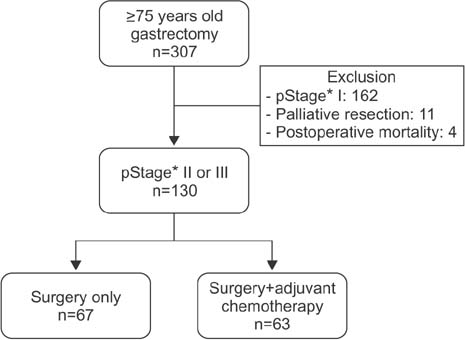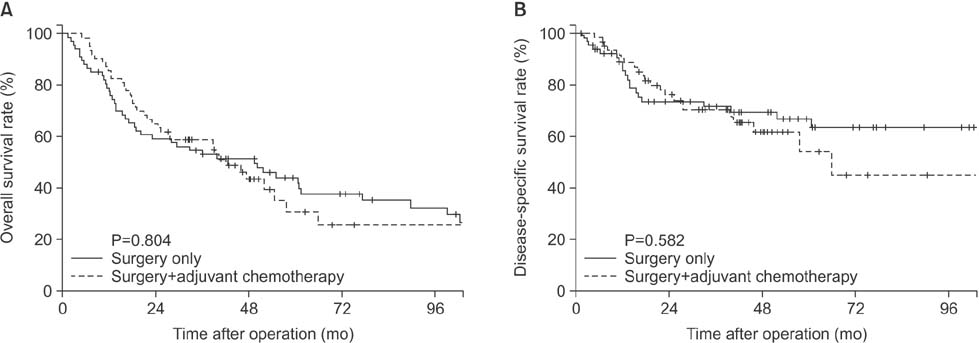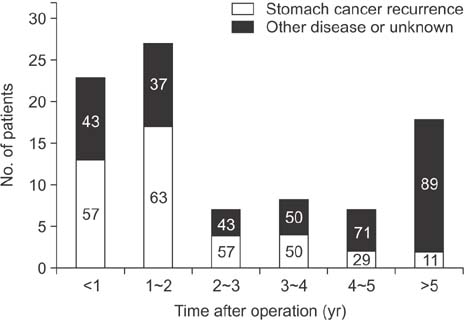J Gastric Cancer.
2016 Dec;16(4):260-265. 10.5230/jgc.2016.16.4.260.
Could Adjuvant Chemotherapy after Surgery Benefit Elderly Patients with Advanced Gastric Cancer?
- Affiliations
-
- 1Department of Surgery, Keimyung University School of Medicine, Daegu, Korea. gsman@dsmc.or.kr
- KMID: 2389852
- DOI: http://doi.org/10.5230/jgc.2016.16.4.260
Abstract
- PURPOSE
The aim of this study was to evaluate tolerance to adjuvant chemotherapy, and to compare survival between treatments using only surgery and using surgery with adjuvant chemotherapy, in elderly patients with advanced gastric cancer who were ≥75 years of age.
MATERIALS AND METHODS
Patients ≥75 years of age who were diagnosed with pathological stage II or III gastric cancer were identified retrospectively and categorized into the surgery only and surgery with adjuvant chemotherapy groups. Clinicopathological and survival data were compared between these two groups.
RESULTS
Among the 130 patients studied, 67 patients underwent curative surgery only, and 63 patients received adjuvant chemotherapy after curative surgery. In the latter group, adverse events were reported in 24 patients (38.1%). The treatments were discontinued in 19 patients (30.2%) owing to any reason. The overall 5-year survival rates of the surgery only and the surgery with adjuvant chemotherapy groups did not differ significantly (44.1% vs. 30.7%, respectively; P=0.804). Among 90 death events, deaths from recurrences of gastric cancer occurred in 42 patients. Multivariate analyses revealed that the American Society of Anesthesiologists score and the depths of tumor invasions were related to survival, and the addition of adjuvant chemotherapy after surgery did not influence survival.
CONCLUSIONS
The decision for the addition of adjuvant chemotherapy for elderly patients should be taken after considering the condition of individual patients and their life expectancies.
Keyword
MeSH Terms
Figure
Reference
-
1. Edwards BK, Howe HL, Ries LA, Thun MJ, Rosenberg HM, Yancik R, et al. Annual report to the nation on the status of cancer, 1973-1999, featuring implications of age and aging on U.S. cancer burden. Cancer. 2002; 4:2766–2792.2. Shin A, Kim J, Park S. Gastric cancer epidemiology in Korea. J Gastric Cancer. 2011; 11:135–140.3. Korean Statistical Information Service. Statistical Database; Population/Household [Internet]. Daejeon: Korean Statistical Information Service;2016. cited 2016 Oct 21. Available from: http://kosis.kr/statisticsList/statisticsList_01List.jsp?vwcd=MT_ZTITLE&parentId=A#SubCont.4. Korenaga D, Moriguchi S, Baba H, Kakeji Y, Orita H, Haraguchi M, et al. Surgery for gastric carcinoma is feasible for patients over 80 years of age. World J Surg. 1991; 15:642–647. discussion 647-648.5. Hanazaki K, Wakabayashi M, Sodeyama H, Miyazawa M, Yokoyama S, Sode Y, et al. Surgery for gastric cancer in patients older than 80 years of age. Hepatogastroenterology. 1998; 45:268–275.6. Jung HS, Park YK, Ryu SY, Jeong O. Laparoscopic total gastrectomy in elderly patients (≥70 years) with gastric carcinoma: a retrospective study. J Gastric Cancer. 2015; 15:176–182.7. Kwon IG, Cho I, Guner A, Kim HI, Noh SH, Hyung WJ. Minimally invasive surgery as a treatment option for gastric cancer in the elderly: comparison with open surgery for patients 80 years and older. Surg Endosc. 2015; 29:2321–2330.8. Yamada T, Hayashi T, Aoyama T, Shirai J, Fujikawa H, Cho H, et al. Feasibility of enhanced recovery after surgery in gastric surgery: a retrospective study. BMC Surg. 2014; 14:41.9. Yamada Y, Higuchi K, Nishikawa K, Gotoh M, Fuse N, Sugimoto N, et al. Phase III study comparing oxaliplatin plus S-1 with cisplatin plus S-1 in chemotherapy-naïve patients with advanced gastric cancer. Ann Oncol. 2015; 26:141–148.10. Sakuramoto S, Sasako M, Yamaguchi T, Kinoshita T, Fujii M, Nashimoto A, et al. Adjuvant chemotherapy for gastric cancer with S-1, an oral fluoropyrimidine. N Engl J Med. 2007; 357:1810–1820.11. Sasako M, Sakuramoto S, Katai H, Kinoshita T, Furukawa H, Yamaguchi T, et al. Five-year outcomes of a randomized phase III trial comparing adjuvant chemotherapy with S-1 versus surgery alone in stage II or III gastric cancer. J Clin Oncol. 2011; 29:4387–4393.12. Bang YJ, Kim YW, Yang HK, Chung HC, Park YK, Lee KH, et al. Adjuvant capecitabine and oxaliplatin for gastric cancer after D2 gastrectomy (CLASSIC): a phase 3 open-label, randomised controlled trial. Lancet. 2012; 379:315–321.13. GASTRIC (Global Advanced/Adjuvant Stomach Tumor Research International Collaboration) Group. Paoletti X, Oba K, Burzykowski T, Michiels S, Ohashi Y, et al. Benefit of adjuvant chemotherapy for resectable gastric cancer: a meta-analysis. JAMA. 2010; 303:1729–1737.14. Wedding U, Honecker F, Bokemeyer C, Pientka L, Höffken K. Tolerance to chemotherapy in elderly patients with cancer. Cancer Control. 2007; 14:44–56.15. Murad AM, Santiago FF, Petroianu A, Rocha PR, Rodrigues MA, Rausch M. Modified therapy with 5-fluorouracil, doxorubicin, and methotrexate in advanced gastric cancer. Cancer. 1993; 72:37–41.16. Glimelius B, Hoffman K, Haglund U, Nyrén O, Sjödén PO. Initial or delayed chemotherapy with best supportive care in advanced gastric cancer. Ann Oncol. 1994; 5:189–190.17. Wagner AD, Unverzagt S, Grothe W, Kleber G, Grothey A, Haerting J, et al. Chemotherapy for advanced gastric cancer. Cochrane Database Syst Rev. 2010; (3):CD004064.18. Monfardini S, Sorio R, Boes GH, Kaye S, Serraino D. Entry and evaluation of elderly patients in European Organization for Research and Treatment of Cancer (EORTC) new-drug-development studies. Cancer. 1995; 76:333–338.19. Kim MC, Kim W, Kim HH, Ryu SW, Ryu SY, Song KY, et al. Risk factors associated with complication following laparoscopy-assisted gastrectomy for gastric cancer: a large-scale korean multicenter study. Ann Surg Oncol. 2008; 15:2692–2700.20. Noh SH, Park SR, Yang HK, Chung HC, Chung IJ, Kim SW, et al. Adjuvant capecitabine plus oxaliplatin for gastric cancer after D2 gastrectomy (CLASSIC): 5-year follow-up of an open-label, randomised phase 3 trial. Lancet Oncol. 2014; 15:1389–1396.




